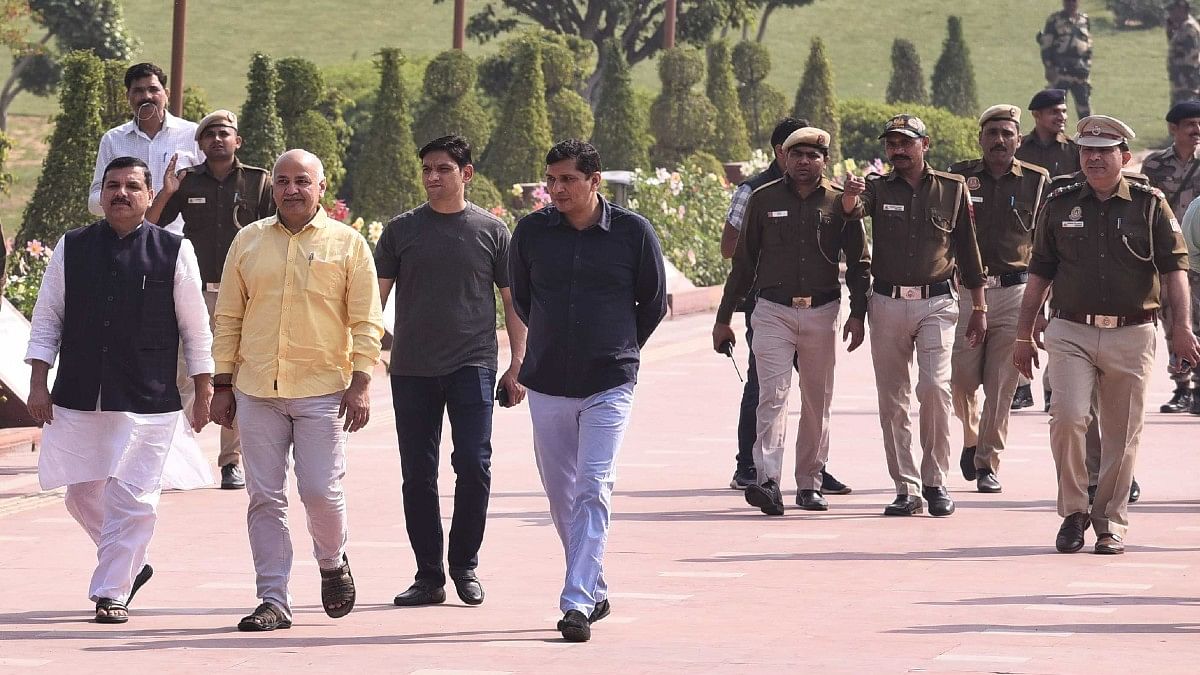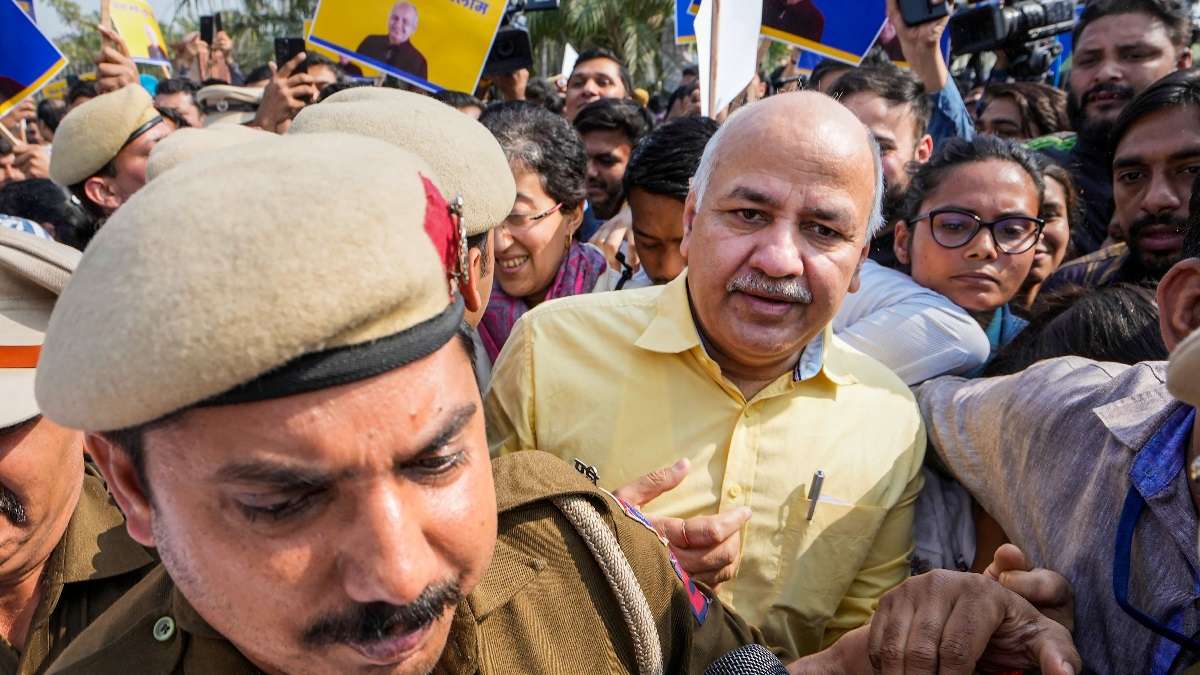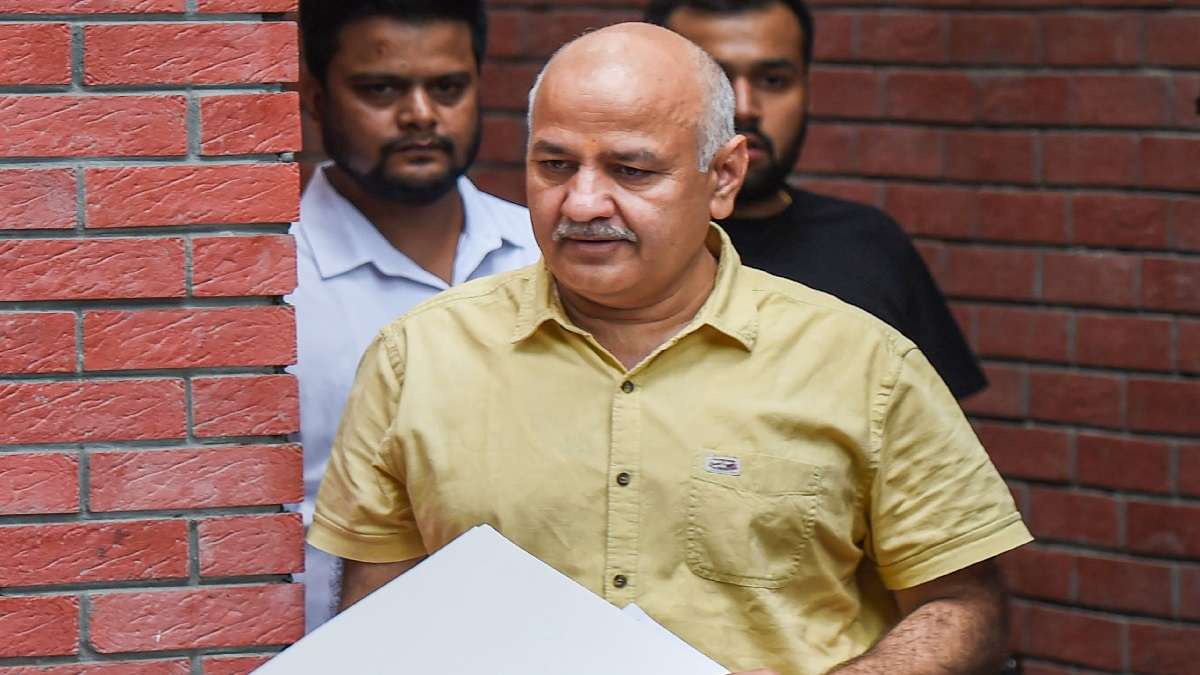What Is The “Liquor Policy Scam” In Delhi That Led To Manish Sisodia’s Arrest?
Manish Sisodia, the Minister in charge of the excise department, "made and implemented important decisions/actions" that were "in contravention of the statutory provisions and the notified excise policy that had huge financial ramifications," according to the Delhi Chief Secretary report.

What Is The “Liquor Policy Scam” In Delhi That Led To Manish Sisodia’s Arrest?
HIGHLIGHTS:
- The scam revolves around allegations of corruption and irregularities in the process of awarding licenses for the retail sale of alcohol in the city.
- When it was discovered that numerous people had filed falsified documents and false information to get licences for the sale of alcohol, the inquiry into the situation brought under way in 2020.
- Sisodia’s arrest has sent shockwaves through the political establishment in Delhi, with many calling for a thorough investigation into the matter.
The Central Bureau of Investigation (CBI) apprehended Manish Sisodia on Sunday in association with the alleged corruption in creating and enforcing the 2021–22 liquor policy, which was subsequently scrapped. Sisodia is the deputy chief minister of Delhi.
Manish Sisodia was detained after spending more than eight hours being questioned by the investigation team. This is an explanation of the scam and how the Delhi Deputy CM became involved.

CONCERNING EXCISE POLICY 2021-2022
The Aam Aadmi Party administration in Delhi enacted the policy beginning on November 17, 2021, based on a report by an expert group. The new policy gave eight hundred forty-nine liquor vends to private businesses through open bidding. There were 32 zones in the city, each with a maximum of 27 vends. Individual licences were replaced by zone-by-zone bidding.
The new policy signalled the local government’s withdrawal from the liquor industry. It was put into place to boost tax collections, improve customer service, and eliminate the influence and black marketing of the booze mafia.
Civil society, religious organizations, educational institutions, Parents’ Bodies, and the opposition all rejected the policy, nevertheless. It was delivered in the midst of the Covid pandemic’s devastating Delta wave. But, in July of last year, the Delhi administration was compelled to revert to the previous alcohol policy and roll back the new excise scheme.
It was immediately claimed that the excise policy 2021–22 of the Kejriwal administration was utilized to grant unjustified financial favours to the holders of liquor licences long after the tenders had been chosen, resulting in significant losses for the exchequer.
Most violations of the GNCTD Act 1991, Transaction of Business Regulations (ToBR) 1993, Delhi Excise Act 2009, and Delhi Excise Rules 2010 were noted in a report from the Chief Secretary of Delhi dated July 8, 2022.
What Is The Liquor Policy Scam In Delhi?
It concerned the Delhi Excise Policy 2021–2022. CBI investigation into alleged anomalies in the scheme was recommended by Delhi Lieutenant Governor VK Saxena; however, it was dropped on July 30.
The regulation became operative on November 17, 2021. According to the policy, Delhi was divided into 32 excise zones, and private players received retail liquor licences for 849 vends. It symbolized the government’s departure from Delhi’s liquor industry.
According to Sources, “it aimed to eradicate the booze mafia and black marketing, enhance revenue, improve the customer experience, and ensure equal distribution of liquor vends.”
The Delhi government also granted retailers some leeway, allowing them to determine their own pricing without regard to the product’s MRP and to give discounts to customers to increase sales.
L-G Orders Probe in Delhi
The investigation into the contentious Delhi Excise Policy 2021–22 of the Arvind Kejriwal–led administration was ordered by Delhi Lieutenant Governor VK Saxena based on the recommendation of the Delhi Chief Secretary.
On July 22, 2022, Delhi LG VK suggested that the CBI conduct an investigation into the alleged procedural errors and rule violations in the application of the excise policy.
MANISH SISODIA’S Involvement

Manish Sisodia, the Minister in charge of the excise department, “made and implemented important decisions/actions” that were “in contravention of the statutory provisions and the notified excise policy that had huge financial ramifications,” according to the Delhi Chief Secretary report.
The study also claimed that Manish Sisodia gave the holders of liquor licences improper financial favours far after the tenders had been chosen, which resulted in significant losses for the exchequer.
The Delhi Chief Secretary stated in his report that the decision was made with the express purpose of helping private liquor barons rather than providing financial advantages to those at the top levels of the government until the Minister in charge of Excise & Finance, Manish Sisodia.
Manish Sisodia and 14 other people were the subjects of an FIR filed by the CBI in a special court in August. The FIR was submitted under several IPC provisions, namely 120B (criminal conspiracy) and 477A (falsification of records), and section 7 of the Prevention of Corruption Act, which concerns utilizing an unfair advantage to persuade a public official through dishonest or illegal methods or through the power of influence.
One of the booze retailers actively involved in anomalies in the formulation and application of the excise policy was Sameer Mahendru, owner of Indospirits, who was accused of making payments in the crores to close associates of Sisodia.
The Central Bureau of Investigation called Manish Sisodia in October, and the organization recorded his statement. Today, February 26, Sisodia was called for the second round of interrogation; after more than eight hours, he was arrested.
CBI’s comments on the Delhi Excise Policy

In an FIR filed in connection with the Delhi Excise Policy 2021–2022, the CBI listed 15 people, with Sisodia at the top of the list.
According to charges in a memo from the L-office, G’s Sisodia, Arava Gopi Krishna, then the commissioner of the Delhi Excise Department, and two other senior excise department officials were “involved in advising and taking decisions pertaining to excise policy for the year 2021–2022, without the consent of competent authorities, with a purpose to offer undue favours to the licensee post tender.”
Amandeep Dhal, the owner of Brindco Spirits, Sameer Mahendru, the owner of Indospirit, and Vijay Nair, the former CEO of entertainment and event management business Only Much Louder, were each accused of being “actively involved in anomalies in framing and execution of excise policy.”
Certain L-1 licence holders, according to the FIR, “are giving credit notes to retail vendors with an ab initio aim to channel the funds as an undue financial advantage to public servants,…showing fake entries in their books of accounts to maintain their record straight.” In conjunction with the investigation, the CBI conducted a raid on Sisodia’s home in August 2022.
What Led To The Involvement Of The Delhi Police EOW?
The updated alcohol regulations included various revisions to the previous regulations, such as permitting licensees to give unlimited discounts and allowing home delivery of alcohol. On May 2, 2022, a group of ministers (GoM) in the Delhi cabinet suggested these amendments.
But before the policy could be put into effect, Chief Secretary Kumar, who was appointed in April of this year, had to review it. After reviewing the proposal, Kumar outlined “procedural breaches” and anomalies in the proposed policy.
On July 8, 2022, Kumar wrote Sisodia, the chief of the excise department, a report requesting an answer to his inquiries. On the same day, copies of the report were also sent to L-G Saxena and Delhi Chief Minister Arvind Kejriwal. The chief secretary also requested that the EOW conduct an investigation into the suspected illegalities, cartelization, and monopolies in the liquor industry.
What Was Revealed By The EOW Investigation?
The Excise Department had meetings over a 15-day period in July 2022, including one on the evening of July 11–12 that apparently lasted until five in the morning, according to digital video recordings (DVRs) gathered by the EOW.
The EOW sent an official notice to the assistant commissioner of the excise department requesting information regarding the purported illegal distribution of liquor licences to businesses that had disregarded the new excise policy’s terms and conditions. Some of the documents and information that were also requested were the dates on which the Delhi Excise Policy 2021–22 was formulated, and the bids for the issuance of liquor licences under the new policy were offered.
The EOW requested all successful applicants who got liquor licences to supply their application forms and any supporting documentation they had provided. Additionally, it demanded that the department outline its steps to stop the monopolization and cartelization of the liquor industry.
What Was The Report Of The Chief Secretary?

Sisodia allegedly changed the excise policy without the L-consent, G’s enabling a waiver of Rs 144.36 crore on the tendered licence fee, for example, according to the report provided to the L-G and CM. According to the report, the Excise Department opted to waive the liquor cartel’s licence fee by 144.36 crore rupees on Sisodia’s direct orders, citing the Covid epidemic.
According to officials, if any modifications are made to an existing policy, the excise department must present them to the cabinet before sending them to the L-G for final approval. The Delhi Excise Rules, 2010, and the Transaction of Business Regulations, 1993, are broken if any amendments are made without the cabinet’s and L-G’s consent.
According to the study, Sisodia increased the prices of imported alcohol and eliminated the 50 rupee import permit charge for each case of beer, giving liquor licence holders unfair advantages. According to the report, this resulted in cheaper imported alcoholic beverages and beer at retail, which caused the state exchequer to lose money.
Sisodia’s arrest has sent shockwaves through the political establishment in Delhi, with many calling for a thorough investigation into the matter. The scandal has also raised concerns about the transparency and accountability of the government’s licensing process and has highlighted the need for greater oversight and regulation in this area.
The Delhi liquor policy scandal serves as a harsh warning about the perils of corruption and the necessity of keeping the highest standards of honesty and integrity in public office. It serves as a lesson for all politicians and public servants and a call to citizens to demand greater openness and accountability from their leaders.
edited and proofread by nikita sharma




